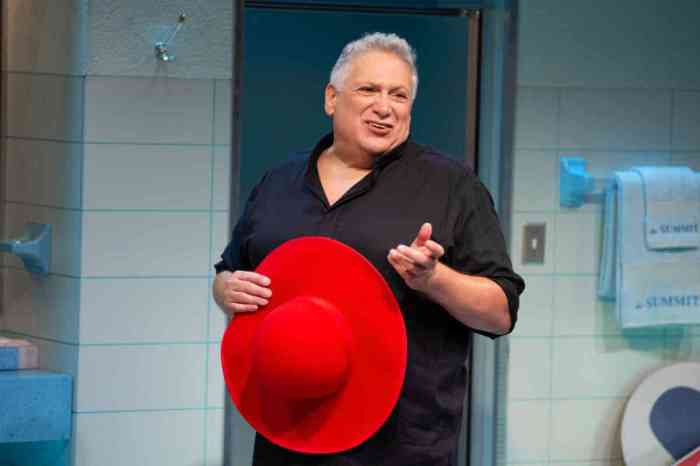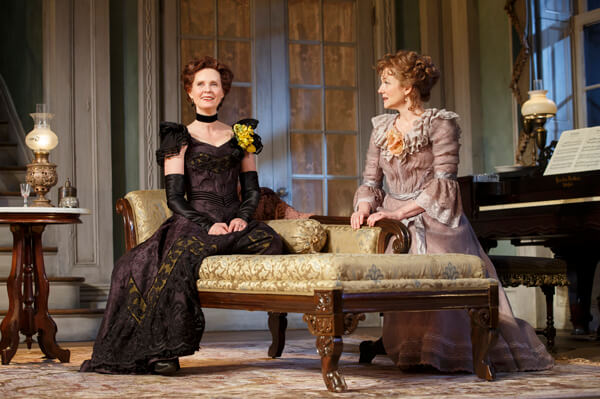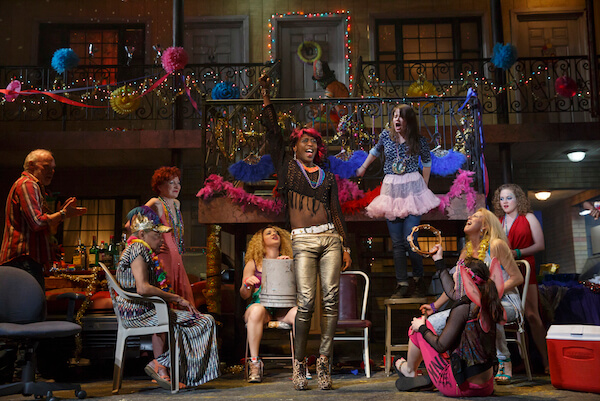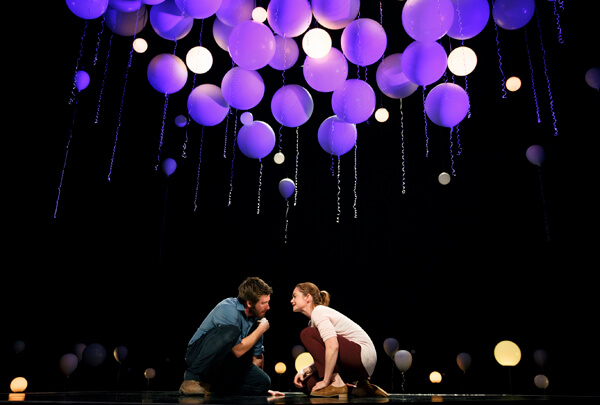John Douglas Thompson and Michael Potts in August Wilson’s “Jitney,” directed by Ruben Santiago-Hudson, at the Samuel J. Friedman Theatre. | JOAN MARCUS
The first Broadway production of August Wilson’s “Jitney,” from Manhattan Theatre Club, delivers the kind of moving and magnificent experience one always hopes for in that moment between the dimming of the houselights and when the action begins on stage.
The play, the first one written in what became Wilson’s 10-play cycle chronicling American black lives in the 20th century, beautifully balances abstract theatricality with searing, believable characters. Set in a jitney station in Pittsburgh’s Hill neighborhood in 1977, the stories of men who drive what New Yorkers know as gypsy cabs flow, overlap, and intersect with the fluidity of jazz, which often inspired Wilson’s writing and dramatic structures. The impressionistic sense of this world, where traditional cabs won’t travel and jitneys are essential to a marginalized community, filled in with episodic unfolding of the men’s lives as they interact in the station, gains dramatic heft as it slowly builds toward a quiet but devastating climax.
The genius of “Jitney” is in the way it summons the challenges facing these characters through snippets of their lives without ever seeming polemical. In many ways, it is reminiscent of a play from 50 years earlier, Elmer Rice’s “Street Scene,” which brought another peripheral world to life, in that case a New York tenement.
An August Wilson Broadway premiere, a witty adaptation by David Ives rewarding in different ways
The characters in “Jitney” are all on the brink of inevitable change. The jitney station is about to be boarded up, part of an urban renewal program aimed at upgrading the Hill, though whether that will really happen is open to doubt. The station owner, Becker, is searching for ways to keep the business running for the men and the community he hopes to have a stabilizing influence on. His estranged son, Booster, is about to be released from jail, having been convicted of murder. The youngest driver, Youngblood, is struggling to show his girlfriend, with whom he has a son, that he has changed and is ready to settle down. Older drivers whose lives are tied to their work wonder what will become of them.
What all of these characters have in common is their search for an identity in a rapidly changing world over which they have little control, a theme that would animate much of Wilson’s subsequent writing.
Under the detailed and big-hearted direction of Ruben Santiago-Hudson, the world of the play is vibrant and compelling. Through the characters, we see the life within the jitney station and get a sense of the world beyond the huge plate glass windows on David Gallo’s inspired, down-at-heels set. Every performance is fully realized, and the ensemble works together with effortless precision.
John Douglas Thompson is powerful as Becker. André Holland is complex, warm, and intense as Youngblood. Carra Patterson, who plays his girlfriend Rena, is the only woman in the piece, and she is grounded, focused, and moving as she fights for the life she wants. Michael Potts as Turnbo, a high-strung, gossipy gadfly, is amazing, as is Keith Randolph Smith as the comparatively complacent Doub. Harvy Blanks’ exuberant portrayal of Shealy, the numbers runner who uses the station’s phone, and Anthony Chisholm as the older, alcoholic Fielding are both outstanding.
It is impossible to see “Jitney” outside the context of the contemporary world. There are no white characters in the play, but their impact and influence can’t be avoided. Whether in displacing a community for urban renewal or denying cab service to a decaying neighborhood, this unseen force imposes undeniable burdens on the characters’ lives. The survival of these jitney drivers amidst this reality is profound, hilarious, and heartbreaking all at once. Given the political moment we are living through, this play disturbingly reminds us how little has changed in the past 40 years.
Tony Roach, Christian Conn, and Carson Elrod in David Ives’ “The Liar,” an adaptation of Pierre Corneille’s 1644 “Le Menteur,” at Classic Stage Company through February 26. | RICHARD TERMINE
David Ives is at it again. He’s taken an antique French play and turned it into a rollicking comedy that will leave you in awe of his linguistic facility, crying with laughter, and thoroughly delighted. Just as he upended Molière with “The School for Lies,” he has now taken on “Le Menteur,” a 1644 piece by Pierre Corneille. “The Liar,” Ives’ adaptation now at CSC, preserves the plot and farcical nature of the original while adding levels of contemporary intellectual silliness that recall the best of “Monty Python” in a brilliant blending of high and low comedy.
The plot concerns a compulsive liar whose tall tales are mostly designed to bolster his own ego and make him seem much more than what he is (contemporary analogies surely coincidental, even if very satisfying). The provincial gentleman Dorante arrives in Paris to find a wife. On his first morning there, he meets the beautiful Clarice, whom he aggressively courts over her objections, going so far as to grab her by the… hand. (It’s 17th century France, after all!) He also meets Clarice’s companion, Lucrece, and acquires a servant, Cliton. And as luck would have it, he reconnects with an old friend, Alcippe. Busy morning.
Alcippe is in love with Clarice. Dorante thinks Lucrece is Clarice, and Cliton falls for Clarice’s servant, the bawdy Isabelle who, unbeknownst to him, has a puritanical twin, Sabine. Meanwhile Dorante’s father is trying to marry him off advantageously. In other words, it’s typical French comedy of the period.
Michael Kahn directs the whole undertaking with wit and verve, and the company is sensational. Christian Conn as Dorante, whose lies mount one on top of the other, is spectacular. Carson Elrod as Cliton is the perfect comic foil, with impeccable timing. Tony Roach as the besotted Alcippe is hilarious, and Kelly Hutchinson is marvelous as Isabelle and Sabine. Amelia Pedlow and Ismenia Mendes as Lucrece and Clarice, respectively, are charming, gamine, and deft comediennes.
Among the many pleasures of this production, the consistent juxtaposition of the Corneille and the contemporary – right down to Adam Wernick’s exceptional original music – is what makes Ives’ latest romp an immediate classic not to be missed.
AUGUST WILSON’S JITNEY | Samuel J. Friedman Theatre, 261 W. 47th St. | Tue.-Wed. at 7 p.m.; Thu.-Sat. at 8 p.m.; Wed., Sat.-Sun. at 2 p.m. | $79-$159 at telecharge.com or 212-239-6200 | Two hrs., 30 mins., with intermission
THE LIAR | Classic Stage Company, 136 E. 13th St. | Through Feb. 26: Tue.-Thu. at 7 p.m.; Fri.-Sat. at 8 p.m.; Sat.-Sun. at 3 p.m. | $61-$126 at ovationtix.com or 866-811-4111 | Two hrs., 15 mins., with intermission




































